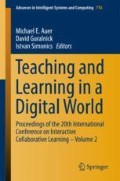Abstract
Nowadays, mind mapping is a rather popular educational technique. Moreover, mind maps became a part of modern educational trends like blended learning and computer-supported collaborative learning. Lots of mind mapping software tools are adopted to teaching and learning routines such as educational content delivery or assessment. This paper focuses on the additional automatic evaluation of digital educational mind maps gained from the existing procedures of assessments. The review of automatic graders which support the evaluation process demonstrated that some systematical work is done in automation grading by comparing students’ mind maps with a template. But lots of questions about automatic mind maps’ scoring by retrieving the data from a scored mind map are still open. This paper introduces the automatic grader for educational mind maps (AGEMM) which acts like a teacher’s assistant and calculates several quantitative metrics. The AGEMM is implemented as a web-service and interacted with digital mind maps prepared in the Coggle web-service through its API. The AGEMM is adopted to the Scientific Research Seminar of “Marketing” bachelor program in National Research University Higher School of Economics (Perm). Results demonstrate that scores from the AGEMM may be transformed to scales or criterial levels which are used to evaluation. Moreover, the AGEMM application revealed several problems and shew lines of development which we discuss in the paper.
Access this chapter
Tax calculation will be finalised at checkout
Purchases are for personal use only
References
Mind map for teaching. Edraw. Visualization Solutions. https://www.edrawsoft.com/mindmap-usage-for-teaching.php. Accessed 05 May 2017
Willis, C., Miertschin, S.: Mind maps as active learning tools. JSCS 21(4), 266–272 (2006)
Budd, J.: Mind maps as classroom exercises. J. Econ. Educ. 35(1), 35–46 (2004)
Wittkower, D.: Mind-mapping inside and outside of the classroom. In: Learning Through Digital Media: Experiments in Technology and Pedagogy, pp. 221–229. Institute for Distributed Creativity (2011)
Dhindsa, H., Makarimi-Kasim, Anderson, O.: Constructivist-visual mind map teaching approach and the quality of students’ cognitive structures. J. Sci. Educ. Technol. 20, 186–200 (2011)
Evrekli, E., Inel, D., Balim, A.: Development of a scoring system to assess mind maps. Procedia Soc. Behav. Sci. 2, 2330–2334 (2010)
Lai, C., Lee, M.: The effects of mind-mapping technique in engineering mathematics. In: IEEE 8th International Conference on Engineering Education (ICEED), pp. 261–264 (2016)
He, F., Miao, X., Wu, B., Yao, S.: Using mind map as learning tool in “Data Structure” teaching. In: IEEE International Conference on Computer and Information Technology, pp. 761–764 (2014)
Zipp, G., Maher, C.: Prevalence of mind mapping as a teaching and learning strategy in physical therapy curricula. J. Sch. Teach. Learn. 13(5), 21–32 (2013)
Evrekli, E., Inel, D., Balim, G.: Mind mapping applications in special teaching methods courses for science teacher candidates and teacher candidates’ opinions concerning the application. Procedia Soc. Behav. Sci. 1, 2274–2279 (2009)
Franklin, A., Li., T., Jamieson, P., Semlak, J., Vaderbush, W.: Evaluating metrics for automatic mind map assessment in various classes. In: Frontiers in Education Conference (FIE), pp. 1–8 (2015)
Evrekli, E., Inel, D., Balim, G.: Mind mapping applications in special teaching methods courses for science teacher candidates and teacher candidates’ opinions concerning the application. Soc. Behav. Sci. 1, 2274–2279 (2009)
Beel, J., Langer, S.: An exploratory analysis of mind maps. In: DogEng 2011, pp. 81–84. ACM (2011)
Jamieson, P., Eaton, J.: Towards a better graphlet-based mind map metric for automating student. In: 122nd ASEE Annual Conference and Exposition, Seattle (2015)
Franklin, A., Sunderhaus, R., Bell, C., Jamieson, P.: Improved method for creating criterion maps for automatic mind map analysis. In: Frontiers in Education Conference, pp. 1–6 (2016)
Jemieson, P.: Using modern graph analysis techniques on mind maps to help quantify learning. In: Frontiers in Education Conference (FIE), pp. 1–6 (2016)
Coggle. Coggle API Documentation. https://embed.coggle.it/diagram/532f2f5007eb88f857000976/06b3a62e14eb54cf7e99086f3cf7dd0398af0ecca4476a8778cad4a67eba53bb. Accessed 15 Feb 2017
Apigee Corp. Web API Design: The Missing Link. https://docs-apis.apigee.io/files/Web-design-the-missing-link-ebook-2016-11.pdf. Accessed 25 Apr 2017
Christie, T.: Home - Django REST framework. http://www.django-rest-framework.org/. Accessed 25 Apr 2017
Buzan, T., Buzan, B.: The Mind Map Book: Radiant Thinking - Major Evolution in Human Thought, 3rd edn. BBC Active, London (2003)
Acknowledgment
The article was prepared within the framework of the Basic Research Program at the National Research University Higher School of Economics (HSE) and supported within the framework of a subsidy by the Russian Academic Excellence Project “5–100”.
Author information
Authors and Affiliations
Corresponding author
Editor information
Editors and Affiliations
Rights and permissions
Copyright information
© 2018 Springer International Publishing AG
About this paper
Cite this paper
Maksimenkova, O., Neznanov, A., Papushina, I., Parinov, A. (2018). On Mind Maps Evaluation: A Case of an Automatic Grader Development. In: Auer, M., Guralnick, D., Simonics, I. (eds) Teaching and Learning in a Digital World. ICL 2017. Advances in Intelligent Systems and Computing, vol 716. Springer, Cham. https://doi.org/10.1007/978-3-319-73204-6_25
Download citation
DOI: https://doi.org/10.1007/978-3-319-73204-6_25
Published:
Publisher Name: Springer, Cham
Print ISBN: 978-3-319-73203-9
Online ISBN: 978-3-319-73204-6
eBook Packages: EngineeringEngineering (R0)

